Your cart is currently empty!
Winter’s chill is fading, allowing Spring to burst through with new life. Unfortunately for many people, this change in seasons also signals the start of sniffling noses, congested chests, itching eyes, and relentless coughs. It’s allergy season.
As we embrace the beauty of the spring season (with tissues in hand), it’s also time to explore nature’s own medicine chest. Thankfully, Chinese herbal medicine offers many different ways to address both the symptoms of allergies and their root causes.
In this blog, we’ll guide you through 15 unique herbal formulas that dispel the discomfort of allergy symptoms while restoring your body’s balance and preventing future attacks. Ready to find your Chinese allergy relief remedy?
Traditional Chinese Medicine and Spring Allergies
Traditional Chinese Medicine (TCM) is an ancient system of health and wellness that has evolved over thousands of years in China.
Unlike Western medicine, which often focuses on treating specific symptoms or diseases, TCM takes a holistic approach to healing the body. In TCM, all organ systems interact with and impact each other. Maintaining balance and harmony within the body – and between the body and its environment – is the key to living well.
When using TCM to improve your health, we take other factors into consideration beyond just the symptoms you have. Things like the current season, your diet, and lifestyle, can all help us find out what the best treatment is for you.
Let’s explore how we can use these factors to determine the pattern of imbalance causing your allergy symptoms, so you can find the best TCM herbal formula for you.
TCM and Spring
In TCM, spring is not just a season; it’s a symbol of growth and renewal. It is also associated with the Wood element, which governs the liver and gallbladder systems.
Spring in TCM is also characterized by the upward and outward movement of energy, which mirrors the natural world as it awakens and blooms. However, this energetic shift can also trigger similar movements in the body (think sneezes and coughs).
TCM and Allergies
Allergies in TCM are often seen as a manifestation of these imbalances, specifically an overreaction of the immune system to irritants like pollen. They are also considered a sign of weak or depleted Qi, or energy. When we are low in Qi (especially Lung Qi), the immune system gets overwhelmed and “misfires” at non-harmful triggers which causes allergies.
But, there are other potential root causes of allergies in TCM. Knowing which one relates to your health most is the key to choosing the right Chinese allergy remedy for you. Most people will fall into one of these patterns if they’re experiencing allergies as a main issue:
- Qi Deficiency
When you don’t have enough Qi or energy to support immunity, this leaves the body vulnerable to issues like allergies. If you have Qi deficiency, you may also notice fatigue, frequent colds, and a pale complexion. - Liver Imbalance
The Liver is associated with the Wood element and Spring. In TCM, it’s role is to maintain the smooth flow of Qi and blood throughout the body. An imbalance can lead to symptoms like irritability, headaches, and, when it comes to allergies, itchy eyes and rashes. - Wind-Heat or Wind-Cold Invasion
In TCM, allergic reactions are often seen as a result of ‘wind’ carrying ‘heat’ (manifesting as itchy red eyes, yellow phlegm, and sore throats) or ‘cold’ (leading to chills, runny clear mucus, and sneezing) into the body. - Dampness
Dampness is an accumulation of fluid or mucus in the body. This can manifest as swelling, acne, excess weight, or even a runny nose and sinus congestion.
Did you find a pattern that matches your symptoms? By identifying and treating the underlying imbalance that causes your allergies, you can alleviate your symptoms while bringing your body back into a state of balance.
Top 15 Chinese Herbal Remedies for Allergy Symptoms
Allergy symptoms can vary widely from person-to-person. Finding the right remedy for you means matching your unique symptoms and overall health condition to the formula that corrects the imbalance. Let’s explore the key formulas to keep in your medicine cabinet:
Chinese Herbal Medicine for Nasal Congestion
In TCM, nasal congestion is often linked to imbalances such as Wind-Cold or Wind-Heat invasion. Another common pattern is the accumulation of Dampness, which can lead to the stagnation of Qi and result in stuffiness and blockage. The specific herbal formulas we offer target these imbalances, aiming to restore the free flow of Qi, dispel the invading pathogen, and clear congestion for unobstructed breathing.
Plum Flower – Magnolia Flower Teapills – Xin Yi Wan
Xin Yi Hua, or magnolia flower, is one of the key herbs for treating allergy symptoms that block the nose. This formula uses magnolia flowers to dispel wind-cold, dry dampness and unblock the nasal passages. It is usually used for chronic sinus issues that have lingered on after colds, or those with persistent seasonal allergies with cold signs (clear mucus, chills, low energy).
Bi Yan Tang (Nose Clear Formula) – Liquid Extract (Tincture)
Clear Nose Formula is just that – a formula that works to unblock stuffy noses and sinuses! This formula is key for anyone who experiences a regular stuffy nose due to seasonal allergies. Because it helps address the root cause of allergies, taking Bi Yan Tang for several months can help reduce your likelihood of allergies in the future.
-
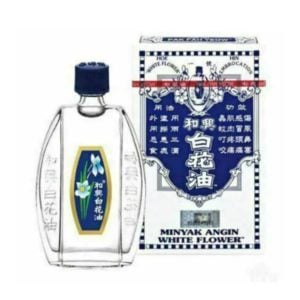 White Flower Oil (Embrocation) – by Hoe Hin Pak Fah Yeow
Starting at $10.99
Add to CartSelect options
This product has multiple variants. The options may be chosen on the product page
White Flower Oil (Embrocation) – by Hoe Hin Pak Fah Yeow
Starting at $10.99
Add to CartSelect options
This product has multiple variants. The options may be chosen on the product page
White Flower Oil (Embrocation) – by Hoe Hin Pak Fah Yeow
The soothing and cooling properties of White Flower Oil make it a go-to for clearing clogged sinuses on the go. It contains eucalyptus, lavender, and peppermint, as well as camphor, menthol, and wintergreen to powerfully break through blockages and relax swollen tissues. Simply apply a small drop near the nostrils to help to open up nasal passages.
Chinese Herbal Medicines for Rhinitis & Sinusitis
Like stuffy noses, rhinitis and sinusitis are often seen as a response to Wind invading the nasal passages. But in this case, we also have an underlying Qi deficiency or an imbalance in the Liver system. This can lead to symptoms like a runny nose, sneezing, and sinus pressure. The best herbal formulas to treat sinusitis and rhinitis are designed to strengthen the body’s Qi, dispel Wind, and clear the nasal passages.
Plum Flower – Six Gentlemen Teapills – Liu Jun Zi Wan
If you suffer from chronic sinus congestion, infections, or post-nasal drip, you likely have a Qi deficiency that keeps your immune system from getting these issues under control. Six Gentlemen Teapills use tonifying herbs to rebuild your body’s defenses and restore your Qi. This addresses the root cause of these chronic conditions and helps prevent them from returning.
Plum Flower – Upper Chamber Teapills (Cang Er Zi Wan)
Tired of constantly blowing your nose during allergy season? This formula is designed to address both acute and chronic sinusitis and rhinitis with profuse nasal discharge. Because this formula addresses the root cause of excess phlegm and inflammation, it can also help with red/itchy eyes, sneezing, and frontal headache.
Xiao Qing Long Wan – by Lao Wei
If you’re someone who gets fever and chills, body aches, and lots of clear, watery nasal discharge when you get allergies or a cold, this formula may help. It is usually taken when someone is sensitive to cold weather, which can easily happen during spring’s temperature fluctuations.
Chinese Herbal Medicine for Cough
Treating cough with TCM can be a complex topic, because there are so many potential underlying causes. Because the Lungs are directly impacted by our outside world (as we breathe the outdoors in, so to speak), they are particularly vulnerable to environmental changes. But, chronic cough can also be a manifestation of several underlying imbalances, such as Lung Qi deficiency, Wind-Heat invasion, or phlegm accumulation due to Spleen Qi deficiency. Each type of cough – whether dry, productive, or chronic – points to a different pattern of imbalance.
Plum Flower – Eight Immortals Teapills – Mai Wei Di Huang Wan
Plum Flower Eight Immortals Teapills is a modified version of the traditional Liu Wei Di Huang Wan formula, enhanced with two extra herbs targeting the Lungs. This formula is particularly effective for treating Lung Yin deficiency, which is characterized by insufficient cooling and moistening fluids in the Lungs. It’s commonly used for chronic dry cough, dry throat, and nasal passages in the elderly, as well as for persistent dry coughs associated with conditions like tuberculosis, HIV, diabetes, and damage from long-term cigarette smoking.
Plum Flower – Bu Fei Teapills – Bu Fei Wan
Bu Fei Teapills help to bolster upper respiratory health. This formula is particularly beneficial for enhancing Lung Qi, making it ideal for those with shortness of breath, wheezing, and chronic cough with hard-to-expel phlegm. Additionally, it’s suitable for those showing signs of Qi deficiency such as frequent colds and flu, a pale complexion, a low voice, poor appetite, and spontaneous sweating.
Qing Fei Hua Tan – by Yunkun
Qing Fei Hua Tang is a traditional Chinese Medicine formula that addresses cough with copious amounts of yellow phlegm. Unlike Bu Fei Wan above, this formula is more suited to those with heat and inflammation affecting the Lungs, which causes yellow, sticky phlegm, fever, irritability, and chest congestion.
Chinese Herbal Medicines for Phlegm & Bronchitis
Bronchitis is often linked with a build-up of phlegm in the Lungs. This usually happens due to a weakness in the Spleen system, where dampness collects and is sent to the Lungs where it collects and develops into phlegm. This can be further complicated by external factors like Wind or Cold invading the body. To fix the problem, we need to focus on strengthening the Spleen, clearing the Lungs, and expelling phlegm to provide holistic relief from bronchitis symptoms. Here are some formulas that help:
Ping Chuan Wan – Ping Chuan Teapill – Kingsway (KGS) Brand
Ping Chuan Wan contains a combination of herbs that clear heat, relieve cough, and soothe the Lungs. It is designed to support the respiratory system and provide relief from symptoms associated with conditions such as asthma and bronchitis.
-
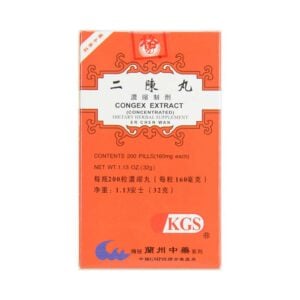 Er Chen Wan – Congex Extract Concentrate – Kingsway (KGS) Brand
Starting at $6.99
Add to CartSelect options
This product has multiple variants. The options may be chosen on the product page
Er Chen Wan – Congex Extract Concentrate – Kingsway (KGS) Brand
Starting at $6.99
Add to CartSelect options
This product has multiple variants. The options may be chosen on the product page
Er Chen Wan – Congex Extract Concentrate
If you’re dealing with endless phlegm, Er Chen Wan can help. However, this formula is designed to relieve bronchitis due to cold (phlegm that is white or clear). Along with congestion in the lungs, this formula can also help reduce phlegm in the stomach, sinuses, or ears.
-
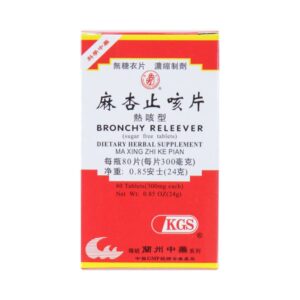 Ma Xing Zhi Ke Pian – Bronchy Releever
Starting at $6.45
Add to CartSelect options
This product has multiple variants. The options may be chosen on the product page
Ma Xing Zhi Ke Pian – Bronchy Releever
Starting at $6.45
Add to CartSelect options
This product has multiple variants. The options may be chosen on the product page
Ma Xing Zhi Ke Pian – Bronchy Releever
Bronchy Releever offers relief for painful lungs and airways, especially useful for bronchial conditions characterized by loud, painful coughs and phlegm discharge. It works by opening airways, ensuring smooth qi flow, and restoring yin-yang balance. This Lung remedy can also effectively treat colds, asthma, and other respiratory issues.
Chinese Herbal Teas for Allergies
Looking for a gentle yet effective way to address allergy symptoms? Sipping on Chinese herbal teas, crafted from a blend of natural herbs, helps balance the body’s Qi, alleviates symptoms like sneezing and itching, and strengthens the body’s natural defense system. These teas are ideal for a daily dose of allergy prevention.
-
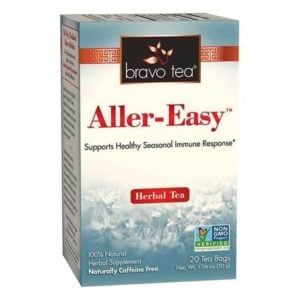 Aller-Easy Tea – by Bravo Tea
Starting at $6.99
Add to CartSelect options
This product has multiple variants. The options may be chosen on the product page
Aller-Easy Tea – by Bravo Tea
Starting at $6.99
Add to CartSelect options
This product has multiple variants. The options may be chosen on the product page
Aller-Easy Tea – Bravo Teas
Want to keep allergies at bay all spring long? Aller-Easy tea supports a healthy immune response, particularly during allergy seasons. Drink daily to bolster your immune system against common allergens, or to manage mild allergy symptoms.
-
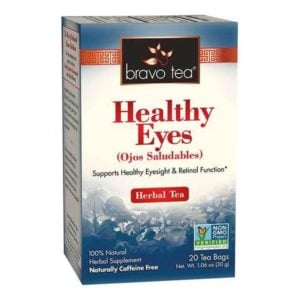 Healthy Eyes Tea – by Bravo Tea
Starting at $6.99
Add to CartSelect options
This product has multiple variants. The options may be chosen on the product page
Healthy Eyes Tea – by Bravo Tea
Starting at $6.99
Add to CartSelect options
This product has multiple variants. The options may be chosen on the product page
Healthy Eyes Tea – Bravo Teas
If seasonal allergies leave your eyes feeling red, hot, itchy, and irritated, Healthy Eyes tea can help. This soothing tonic uses herbs that contain antioxidants and nutrients to support the health of the eyes and prevent inflammation.
-
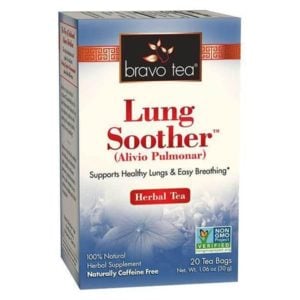 Lung Soother Tea – by Bravo Tea
Starting at $6.99
Add to CartSelect options
This product has multiple variants. The options may be chosen on the product page
Lung Soother Tea – by Bravo Tea
Starting at $6.99
Add to CartSelect options
This product has multiple variants. The options may be chosen on the product page
Lung Soother Tea – Bravo Teas
One of the main organs involved in allergies in TCM is the Lung system. Give your Lungs the TLC they need to stand up to seasonal allergies, cough, and other respiratory issues with a gentle Lung Soother tea. Based on a classic formula of Traditional Chinese Medicine, this blend helps maintain balanced lung and respiratory conditions while soothing and supporting healthy airways for easy breathing.
Win the Battle Against Seasonal Allergies with Chinese Herbs
Seasonal allergies can stop even the most ardent wellness warriors in their tracks. While beating these symptoms naturally may seem unrealistic, Traditional Chinese Medicine for spring allergies is your secret weapon.
From Lung-soothing blends to the immunity-boosting formulas, Chinese herbs offer a solution to the wide range of symptoms that come with spring allergies. Remember, each person experiences allergies differently. The key to finding a formula that works for you is getting to the root of your allergies and understanding your pattern of imbalance. Step into spring feeling your best with these and other herbal tonics for allergies, sinuses, and respiratory health. Here’s to breathing easier, seeing clearer, and embracing the spring season!
Share This
Table of Contents
- Traditional Chinese Medicine and Spring Allergies
- Top 15 Chinese Herbal Remedies for Allergy Symptoms
- Win the Battle Against Seasonal Allergies with Chinese Herbs
About the Author
Blog Categories
- Adaptogen Articles (8)
- Brain Health Articles (9)
- Chinese Medicine Basics Articles (13)
- Chinese Medicine for Pain Articles (15)
- Chinese Medicine for Pets Articles (3)
- Chinese Medicine for Skin Conditions Articles (6)
- Chinese Medicine Formula Articles (6)
- Chinese Medicine Sleep Articles (4)
- Conditions & Concerns Articles (24)
- Digestive Issues (5)
- Eating for the Seasons (2)
- Health & Lifestyle Articles (17)
- Heart Health Articles (4)
- In the News (1)
- Medicinal Mushrooms Articles (7)
- Men's Health Articles (8)
- Scholarships (5)
- Uncategorized Articles (9)
- Weight Loss, Diet & Obesity Articles (5)
- Women's Health Articles (10)
Articles Related To 15 Herbal Formulas to Conquer Spring Allergy Symptoms
-
Ahhh, Spring! We all love to welcome its return after a long and dreary winter. The sun shines upon us, we have more energy, the temperature warms up, and new growth reminds us that there is always time for a fresh start. New beginnings and brighter days are ahead. And then…the seasonal woes ramp up.…
-
These days, trying to stay on top of a successful career, a clean home, a vibrant social life, and healthy habits can feel impossible. We burn the candle at both ends to try to have it all, which leaves many of us feeling burned out. But burnout is more than a buzzword – it’s a…
-
Of all the senses, vision is one of the most essential. Yet, few people know how to take care of their eyes naturally. Unfortunately, many of our daily habits sabotage our eye health and vision. Excessive screen time from phones and computers tires the eyes and impairs our vision. Plus, pollution, makeup, and environmental factors…
-
Ever feel like your heart is dancing to its own beat? You may be experiencing Atrial Fibrillation (commonly known as AFib), which is a condition that causes irregular heartbeats. Having frequent palpitations or an irregular heartbeat can be quite unsettling, plus it may bring potential health risks along with it. While modern medicine offers various…
-
Struggling to breathe? That’s a feeling no one wants to experience. Unfortunately, for over 262 million people across the world, conditions like asthma can quite literally “take your breath away.” But beyond inhalers and mediations, is there anything you can do to reduce asthma attacks – or even stop them from occurring altogether? Asthma is…


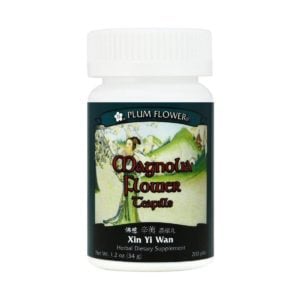 Plum Flower – Magnolia Flower Teapills (Xin Yi Wan)
Plum Flower – Magnolia Flower Teapills (Xin Yi Wan)
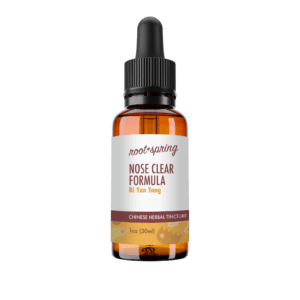 Bi Yan Tang (Nose Clear Formula) – Liquid Extract (Tincture)
Bi Yan Tang (Nose Clear Formula) – Liquid Extract (Tincture)
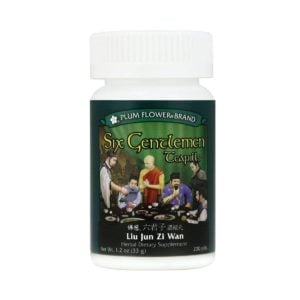 Plum Flower – Six Gentlemen Teapills (Liu Jun Zi Wan)
Plum Flower – Six Gentlemen Teapills (Liu Jun Zi Wan)
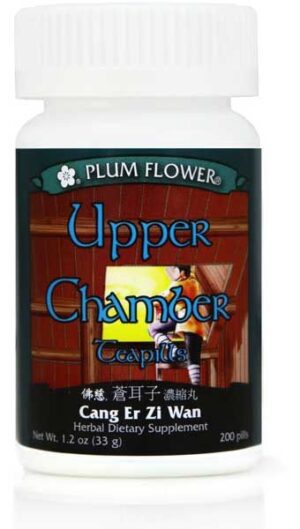 Plum Flower – Upper Chamber Teapills (Cang Er Zi Wan)
Plum Flower – Upper Chamber Teapills (Cang Er Zi Wan)
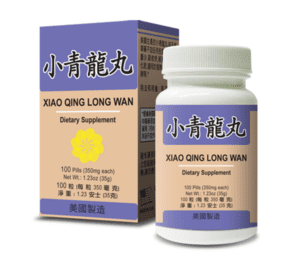 Xiao Qing Long Wan – by Lao Wei
Xiao Qing Long Wan – by Lao Wei
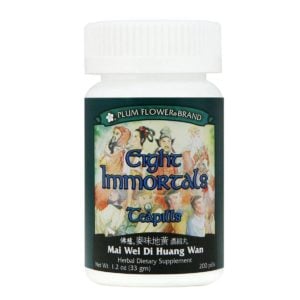 Plum Flower – Eight Immortals (Mai Wei Di Huang Wan)
Plum Flower – Eight Immortals (Mai Wei Di Huang Wan)
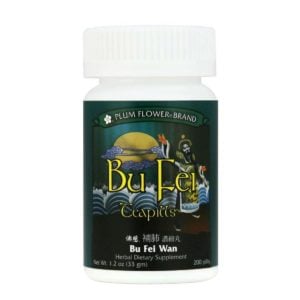 Plum Flower – Bu Fei (Bu Fei Wan)
Plum Flower – Bu Fei (Bu Fei Wan)
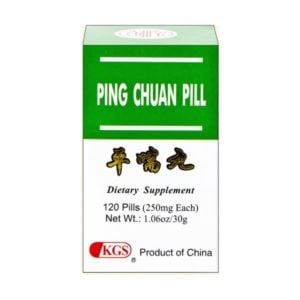 Ping Chuan Wan – Ping Chuan Teapill – Kingsway (KGS) Brand
Ping Chuan Wan – Ping Chuan Teapill – Kingsway (KGS) Brand